| dc.contributor.author | Brendjord, Caroline | |
| dc.contributor.author | Brunstad-Kvaløy, Laila | |
| dc.date.accessioned | 2022-07-22T06:03:52Z | |
| dc.date.available | 2022-07-22T06:03:52Z | |
| dc.date.issued | 2022 | |
| dc.identifier.uri | https://hdl.handle.net/11250/3007665 | |
| dc.description.abstract | Oppgavens tematikk bunner i hvordan arbeidslinja kan påvirke hvordan AI-konsulenter arbeider med deltakere som har angstlidelser. Arbeidslinja, eller aktiveringspolitikken, innebærer at velferdsstatens ytelser skal utformes på en måte som gjør at de stimulerer folk til å arbeide. Aktivitetskrav, graderte ytelser, avkortningsregler, og sanksjoner bidrar til å gjøre dagens trygdeytelser mer aktivitetsorienterte. Dette skal bidra til å få personer som har kortvarig fravær fra arbeidslivet tilbake i arbeid, noe som tilsynelatende har en god effekt. Å være i arbeid skal i teorien kunne forebygge sosiale problemer, men arbeidslinje politikken kan være problematisk i praksis. Kanskje spesielt for personer med psykiske vansker som for eksempel angst. Oppgaven har etikkteori som sitt hovedperspektiv. Vi har brukt kvalitativ forskningsmetode, og intervjuet tre AI-konsulenter ansatt i ulike AI-bedrifter for å svare på problemstillingen. De teoretiske perspektivene vil derfor bli sett i lys av våre empiriske funn. Funn – og diskusjonsdelen vil illustrere AI-konsulentens ulike arbeidsfaser. Diskusjonen viser hvordan AI-konsulentene blir satt i et spenn mellom plikten som arbeidstaker og et ønske om å gi god hjelp. Det vil også bli presentert en forståelse av utfordringene AI-konsulentene møter i yrkesutøvelsen sin. Disse elementene leder oss til en konklusjon om at arbeidslinja kan påvirke AI-konsulentenes fokus i samarbeidet ved at målet om arbeid er definert i forkant. Til tross for ønsket om å hjelpe, vil målet om arbeid kunne bli overskyggende ovenfor angstproblematikken. Dette gjør det nødvendig med god etisk skjønnsutøvelse, mer tid og ressursbruk og tilrettelagt hjelp. Dette oppsummerer essensen i hva som kjennetegner AI-konsulentenes arbeid med personer som har angstlidelser, noe som kan være interessant å forske videre på både på individ - og samfunnsnivå. | en_US |
| dc.description.abstract | Abstract
The topic of this thesis aims to explore how the workline policy can affect how AI-consulants cooperate with participants with anxiety disorders. The workline policy, or the labor market policy means that the welfare system benefits should be designed in a way that stimulates people to work. Activity requirements, graded social benefits, shortening rules, and sanctions contribute to make today's social security benefits more activity oriented. This will help to get people who have short-term absence from work life back to work, which apparently has a good effect. Employment should in theory prevent social problems, but the workline policy can be problematic in practice. Especially for people with mental health issues such as anxiety. The thesis has theory about ethics as its main perspective. We have used a qualitative research method and interviewed three AI-consultants employed in different AI-companies to answer the topic question. The theoretical perspectives will therefore be seen in the light of our empirical findings. The findings and discussion section will illustrate the AI-consultant's different work phases. The discussion shows how the AI-consultants are put in a tension between their duty as an employee and the desire to provide good help for their participants. An understanding of the challenges that AI-consultants face in their professional practice will also be presented. These elements lead us to a conclusion that the workline policy can influence the AI-consultants' focus in the collaboration by defining the goal of work in advance. Despite their desire to help, the goal of work may overshadow the focus of the anxiety issues. This necessitates good ethical exercise of discretion, more time and resources and adapted help for the participants. This sums up the essence of what characterizes the AI-consultants' work with people with anxiety disorders, which may be interesting to research further at both an individual and a societal level. | en_US |
| dc.language.iso | nob | en_US |
| dc.publisher | Høgskulen i Volda | en_US |
| dc.title | Arbeidslinja – pisk eller gulrot? En kvalitativ intervjustudie av over hva som kjennetegner AI-konsulenters arbeid med deltakere som har angstlidelser | en_US |
| dc.type | Bachelor thesis | en_US |
| dc.source.pagenumber | 51 | en_US |
